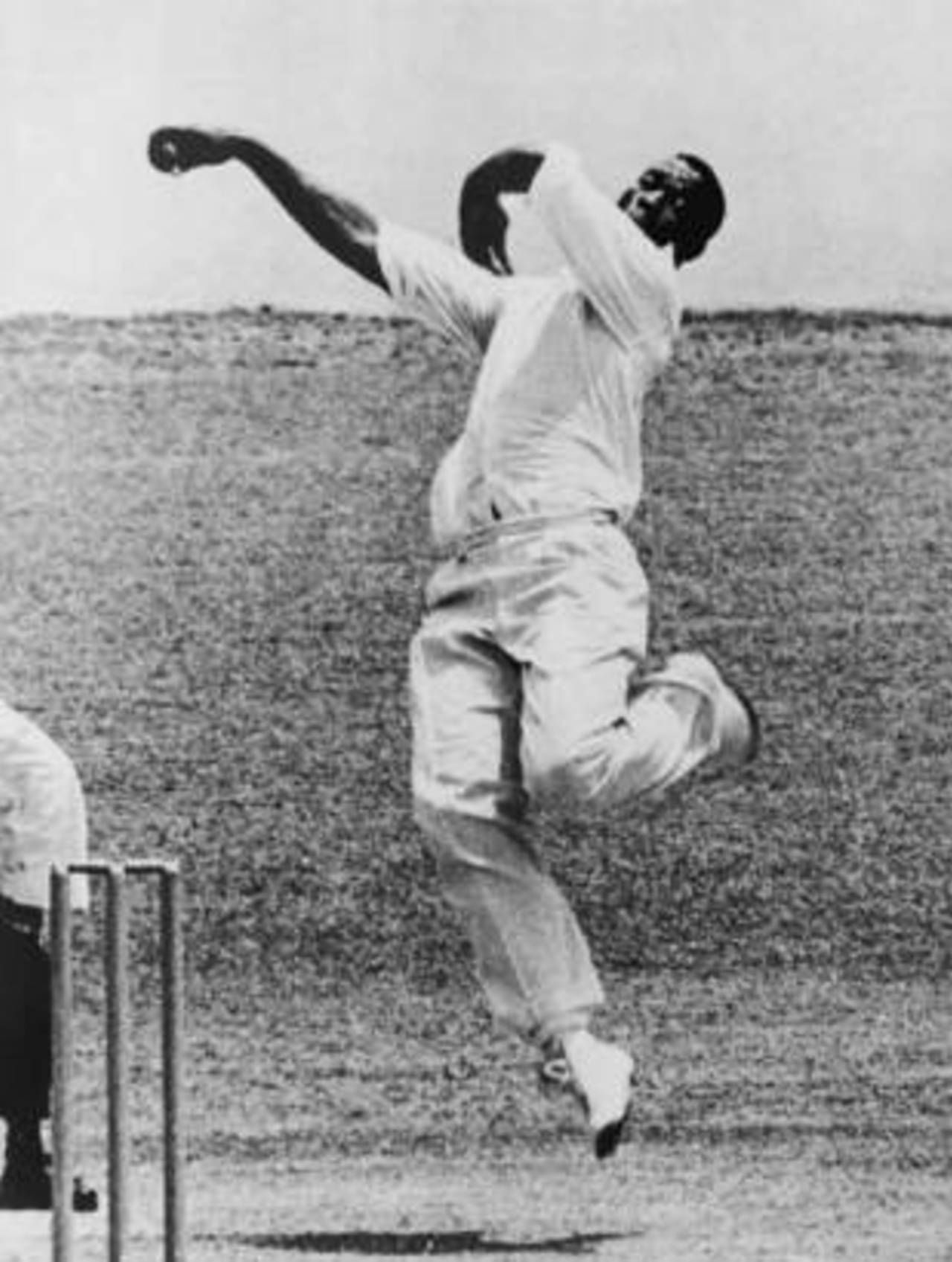Gentlemen, let's pray
Tatenda Taibu recently quit cricket to join the church. Here are other cricketers who were also men of the cloth

Wes Hall: put the fear of god into batsmen around the world • Getty Images
The man who eventually became the Lord Bishop of Liverpool played 22 Test matches, the last 14 of them after being ordained as a priest in 1955. Sheppard had captained England twice against Pakistan the previous year. In 1956 he was recalled for the fourth Ashes Test against Australia and made 113 - Sheppard was the middle man in a notable hat-trick by the selectors, who brought back Cyril Washbrook for the previous Test and saw him make 98; for the final Test they recalled Denis Compton, after a knee operation, and he scored 94. Sheppard played little cricket after that, but in 1962-63 he took a sabbatical from the church and toured Australia again, 12 years after his first tour, and scored 113 in the second Test in Melbourne. His batting survived the long layoff, but his fielding was a bit rusty. Legend has it that after Sheppard had dropped several chances, Fred Trueman advised him: "Kid yourself it's Sunday, Rev, and keep your hands together."
After his playing days were over the great West Indian fast bowler Hall - now Sir Wesley - became a priest in his native Barbados. During his playing days, Hall's wonderful flowing action and high speed probably forced a few batsmen to pray, too.
A member of Lord Harris' team that played a Test in Australia in 1878-79 - the third one of all - Lancashire's Royle was a handy batsman and a fine fielder at a time when this was unusual. "Whoa, mate, there's a policeman," yelled Yorkshire's Tom Emmett to his batting partner after being called for a single with Royle on the prowl in the covers. During the 1880s Royle was ordained, and later became headmaster of Elstree School.
Ernest "Mick" Waddy was a stylish batsman who once scored a triple-century for Sydney University. He topped the Sheffield Shield averages in 1904-05, and three years later - by which time he had been ordained - a century against the England tourists for New South Wales earned him selection in the XII for the final Test in Sydney. In the end, though, he was made 12th man, and never did play for Australia. He left for England in 1915, taught for years at Rugby School, and later became a country vicar.
A fine batsman who scored almost 18,000 first-class runs, mainly for Warwickshire, and unusually appeared for both the Gentlemen and the Players, Parsons entered the Church in 1929, five years before his county career ended. Harold Larwood, an exacting judge, said that Parsons was "a gentleman, a beautiful cricketer and a punishing batsman whom it was a pleasure to play against".
Gillingham was born in Japan and died in Monte Carlo... and packed a lot in between: county cricket for Essex, for whom he hit 201 against Middlesex in 1904, not long after being ordained; a score of 75 for Gents v Players in 1925, when he was 50; service as chaplain to King George VI (and later Queen Elizabeth); and being one of the first radio cricket commentators - although he was jettisoned by the BBC after he read out the ground advertisements in a bid to fill in time during a rain break.
The owner of one of the strangest cricket careers of all, the Rev Reginald Moss was called up to make his County Championship debut for Worcestershire a record 32 years after his previous first-class match, against the 1893 Australian tourists. By 1925, Moss was 57, and the rector at Icomb, in Stow-on-the-Wold: he took two catches and a wicket against Gloucestershire in May 1925, but never played again.
A stylish opener, Killick played two Tests for England, against South Africa in 1929 - opening with Herbert Sutcliffe - after a fine season for Oxford University in which he averaged more than 50. He was ordained the following year, and never played another full season - although he did make occasional appearances for Middlesex, hitting 206 against Warwickshire in his only match in 1931, and a fine 74 against the 1939 West Indian tourists at Lord's.

The Rev Henry Foster was not a notable cricketer himself, although he once made 57 for 22 of Worcestershire against the United South of England XI. But his legacy to cricket was seven sons, all of whom played for Worcestershire, leading them to be jokingly referred to for a while as "Fostershire". One of the seven, Reginald "Tip" Foster, scored 287 on his Test debut for England in Sydney in 1903-04.
Vockins was a genial presence at New Road as secretary of Worcestershire for 30 years until 2001. Late on in his tenure he took holy orders, and is now a Prebendary of Hereford Cathedral: he also serves three local parishes on the slopes of the Malvern Hills. Last year he produced an acclaimed biography of Arthur Milton, who played cricket and football for England.
One of cricket's earliest big names, Lord Frederick Beauclerk (1773-1850) was also something of a rogue (or worse: he was once described as "cruel, unforgiving, cantankerous and bitter", and elsewhere as a "vile scoundrel"). Despite the church's opposition to gambling, he freely claimed to earn more than £600 a year (a huge sum by modern standards) from betting. He was a fine batsman, though, and a handy slow bowler: he scored 102 not out for "England" against Surrey at Lord's in 1805, after the first four batsmen all bagged ducks, and four years later made 114 for MCC against England. Beauclerk was the son of the Duke of St Albans, and was the town's vicar from 1828 until his death.
Steven Lynch is the editor of the Wisden Guide to International Cricket 2012